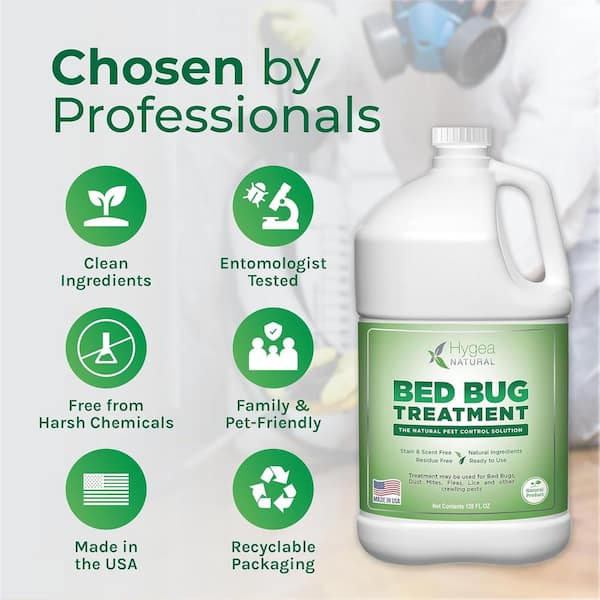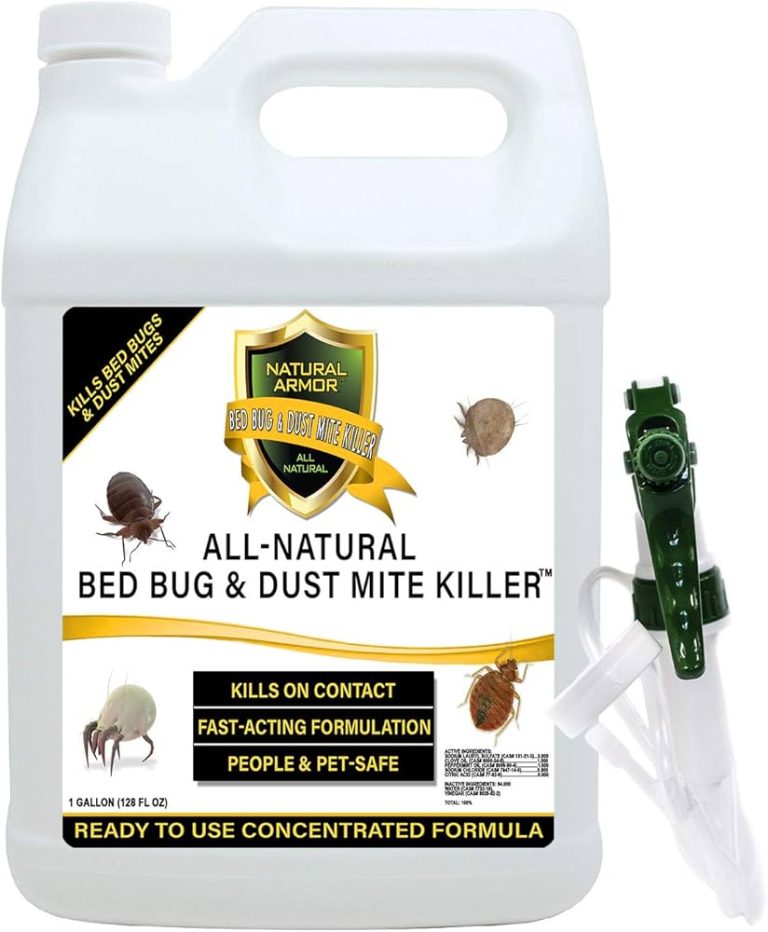Are pesky bugs invading your space, making you feel like you’re in a constant battle? You want them gone, but you’re torn between natural and chemical solutions.
It’s crucial to choose wisely, not just for your peace of mind, but also for the health of your home and the environment. Imagine a solution that works effectively without compromising your safety or the planet’s well-being. This decision could impact not only your immediate surroundings but also your long-term health.
Dive into this article to uncover the truth about natural and chemical bug killers, and discover which option truly aligns with your needs and values. Your ultimate bug-busting solution awaits.

Credit: www.arbico-organics.com
Pros And Cons Of Natural Bug Killers
Natural bug killers are increasingly popular. They offer a greener alternative to chemical pesticides. But like any pest control method, they have their pros and cons. This section explores the benefits and limitations of natural bug killers.
Environmental Benefits
Natural bug killers are eco-friendly. They break down quickly and leave no harmful residues. This means less pollution in soil and water. They also help maintain biodiversity by targeting specific pests. This reduces harm to beneficial insects and plants.
Safety For Humans And Pets
Natural bug killers are often safer for humans and pets. They contain fewer harsh chemicals that can cause health issues. Families with children and pets find this appealing. It’s a relief knowing the household is exposed to less toxicity.
Effectiveness And Limitations
Natural bug killers can effectively control many pests. Yet, they may not work as quickly or thoroughly as chemical options. Some pests require repeated applications for control. This can be time-consuming. Also, they may not work on severe infestations.

Credit: www.arbico-organics.com
Pros And Cons Of Chemical Bug Killers
Chemical bug killers offer quick and effective solutions to pest problems. They can eliminate insects swiftly but may harm the environment and human health. Balancing their benefits and risks is crucial when considering natural versus chemical options.
Understanding the pros and cons of chemical bug killers can help you make an informed choice for your home and garden. While these products are often effective and quick, they come with their own set of challenges. Let’s break down the benefits and drawbacks to help you decide if chemical bug killers are the right choice for you.Quick Action And Efficiency
Chemical bug killers are renowned for their rapid results. Many users find that these products deliver immediate relief from pests, making them a popular choice for urgent infestations. You might appreciate how quickly they can clear out bugs, especially when you’re hosting a gathering or maintaining your garden. These products are designed to target specific pests, ensuring efficient use. For instance, a spray for ants will specifically affect their nervous system, providing targeted action. This efficiency means you often need less product to achieve the desired effect, saving you time and resources. However, their quick action can sometimes be deceptive. While bugs disappear swiftly, repeated applications may be necessary, which can increase costs. Does the speed outweigh the potential need for regular use?Health Risks And Safety Concerns
Chemical bug killers often come with health warnings. Exposure can lead to skin irritation, respiratory issues, or even more severe health problems if not handled properly. Always ensure you read labels thoroughly and follow safety instructions to minimize risks. If you have children or pets, the stakes are higher. Curious hands or paws might come into contact with treated surfaces, posing additional risks. Consider whether the convenience of chemical solutions justifies the potential health hazards in your home. Personal experience can shed light here. I once used a chemical spray indoors and found my eyes watering and throat itching within minutes. It was a stark reminder of why ventilation and protective gear are crucial when using these products.Environmental Impact
Chemical bug killers can have significant environmental consequences. These products often contain substances that linger in soil and water, affecting non-target organisms. The residual chemicals can harm beneficial insects, like bees and butterflies, essential for a healthy ecosystem. The impact extends beyond your immediate surroundings. Runoff from treated areas can contaminate local waterways, impacting aquatic life. Think about the broader implications of your choice—are you willing to trade short-term pest control for long-term environmental damage? So, when considering chemical bug killers, weigh their quick action and efficiency against the health risks and environmental impacts. Are there safer alternatives that could offer a better balance for your needs?Popular Natural Bug Killer Options
Choosing between natural and chemical bug killers can be tricky. Many people prefer natural options for a safer environment. Natural bug killers often use ingredients found in nature. These options can be effective and less harmful. Let’s explore some popular natural choices.
Essential Oils
Essential oils are a popular natural bug killer. They come from plants and have strong scents. These oils can repel many types of bugs. Peppermint and lavender oils are common choices. Just mix a few drops with water. Spray the mixture around your home. This creates a barrier that bugs dislike.
Diatomaceous Earth
Diatomaceous earth is another natural bug killer. It’s a powder made from fossilized algae. This powder can kill bugs by dehydrating them. Sprinkle it in areas where you see bugs. It works well for ants, fleas, and bed bugs. Make sure to use food-grade diatomaceous earth.
Neem Oil
Neem oil comes from the seeds of the neem tree. It disrupts the life cycle of insects. Neem oil is effective against many garden pests. Mix it with water and spray on plants. It can also be used indoors. Neem oil is safe for humans and pets.

Credit: www.homedepot.com
Popular Chemical Bug Killer Options
Chemical bug killers often work quickly and efficiently to eliminate pests. Natural options are gaining popularity for their eco-friendly impact. Choosing between these depends on your priorities for effectiveness and environmental safety.
When it comes to battling bugs in your home, chemical bug killers often pop up as a quick solution. With a variety of options available, it can get confusing to pick the right one. Let’s delve into some popular choices to help you make an informed decision. ###Synthetic Pesticides
Synthetic pesticides are common in many households. They are designed to kill pests quickly and efficiently. However, have you ever wondered about the long-term effects on your health and the environment? While they are effective, these pesticides can leave residues that linger in your home. It’s crucial to use them sparingly and follow safety guidelines. Always store them out of reach of children and pets. ###Insecticidal Sprays
Insecticidal sprays offer convenience. They come in handy cans you can easily store under your kitchen sink. But are they the best choice for every situation? These sprays can target specific bugs, allowing for a tailored approach. Yet, overuse may lead to resistance, making bugs harder to eliminate. Have you considered rotating products to avoid this issue? ###Bait Stations
Bait stations are a clever solution for persistent pests. You place them in strategic locations, and they lure bugs into a trap. Does this sound like something you’d try in your battle against bugs? These stations work well for ants and cockroaches, drawing them away from your living spaces. However, patience is key as they often take time to show results. Are you willing to wait for a more permanent solution? Choosing the right chemical bug killer involves weighing the pros and cons of each option. Have you considered how these choices align with your values and lifestyle?Factors To Consider When Choosing
Choosing between natural and chemical bug killers involves several considerations. Think about safety for humans and pets. Assess environmental impact. Evaluate effectiveness and cost.
Factors to consider play a vital role in choosing between natural and chemical bug killers. Making the right choice ensures effective pest control without unwanted consequences. Various factors like the type of pest problem, safety concerns, and environmental impact guide this decision.Type Of Pest Problem
Identifying the pest problem is crucial. Different pests require different approaches. Some bugs respond better to natural solutions. Others demand chemical intervention for effective elimination. Choose a method that targets the specific pest you face. For instance, aphids can be controlled naturally with neem oil. Termites might require chemical treatments for full eradication.Safety Concerns
Safety is a priority in pest control. Consider who will be exposed to the treatment. Natural options are generally safer for children and pets. Chemicals can pose risks if mishandled. Always read labels and follow instructions carefully. This ensures safe application and minimizes health risks. If unsure, consult a pest control expert for advice.Environmental Impact
Environmental impact matters in pest control choices. Natural solutions often have less impact on ecosystems. Chemical treatments can harm beneficial insects and soil health. Opt for eco-friendly options when possible. These preserve biodiversity and reduce pollution. Understanding the long-term effects of each choice is important. Protecting the environment should be part of your pest control strategy.Tips For Using Bug Killers Safely
Keeping your home bug-free is a priority, but it’s crucial to do it safely. Whether you choose natural or chemical bug killers, understanding how to use them effectively can make a big difference in protecting your health and the environment. Let’s dive into some practical tips for using bug killers safely.
Proper Application Techniques
Applying bug killers correctly ensures they work effectively without posing risks. First, always read the label instructions carefully. They guide you on how much product to use and where to apply it. Apply the product directly where pests are found, and avoid overuse, which can harm beneficial insects.
Consider using a targeted approach. If you’re spraying, aim for corners and crevices where bugs hide. For powders, sprinkle them lightly over affected areas. Remember, precision beats quantity in pest control.
Storage And Disposal
Storing bug killers properly is as important as using them. Keep them in their original containers, tightly sealed, and away from children and pets. Store them in a cool, dry place to maintain their effectiveness.
Disposal is another critical aspect. Never pour unused products down the drain. Instead, check local guidelines for hazardous waste disposal. It’s not just about following rules; it’s about safeguarding our water systems.
Protective Measures
Protect yourself during application. Wear gloves, long sleeves, and masks if recommended. This minimizes exposure to potentially harmful substances. Safety isn’t just about what you apply; it’s about how you protect yourself.
Consider the weather conditions. Wind can carry sprays and powders to unintended areas, increasing exposure risk. Choose a calm day for application to ensure the product stays where it’s needed.
Reflecting on a time I mishandled a bug killer reminds me of the importance of these tips. A simple oversight led to irritation, teaching me that safety steps, no matter how small, are essential. So, how do you ensure you’re using bug killers safely?
Frequently Asked Questions
What Is The Difference Between Natural And Chemical Pest Control?
Natural pest control uses organic methods like predators and plant extracts. Chemical pest control employs synthetic pesticides to eliminate pests quickly. Natural methods are safer for the environment, while chemicals can be more effective but may harm beneficial organisms and cause health risks.
Choose based on safety, effectiveness, and environmental impact.
What Is The Most Effective Natural Bug Repellent?
Lemon eucalyptus oil is the most effective natural bug repellent. It provides protection against mosquitoes and ticks. Its active ingredient, PMD, is recommended by the CDC. Applying it directly or using it in sprays helps keep bugs at bay. Always test for allergies before use.
Which Pest Control Is Best Herbal Or Chemical?
Herbal pest control is eco-friendly and safe for humans and pets. Chemical pest control is often more effective and faster but may pose health risks. Choose based on your needs and sensitivity to chemicals.
What Are The Disadvantages Of Natural Pest Control?
Natural pest control may take longer to show results. It often requires precise application and monitoring. Some methods are less effective for large infestations. There’s potential harm to beneficial insects. Costs can be higher due to increased labor and materials.
Weather conditions might affect effectiveness.
Conclusion
Choosing between natural and chemical bug killers involves careful thought. Natural options are safer for families and pets. They offer eco-friendly solutions. Chemical bug killers work fast and effectively. But, they can pose health risks. Consider your specific needs. Think about the environment.
Evaluate the safety of your household. Both options have pros and cons. Educate yourself on each method. Make informed decisions for pest control. Balance effectiveness with safety. Always read product labels. Seek expert advice if needed. Your choice can impact your home and garden.
Select wisely for a pest-free environment.


